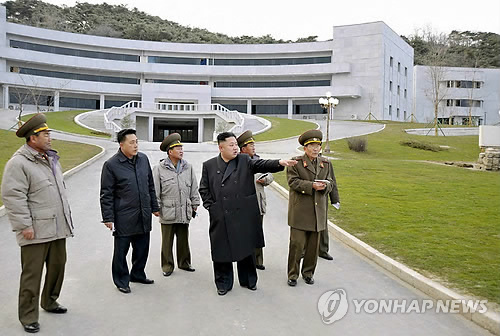The US’ travel ban to North Korea is causing the communist state’s only international college to struggle to find replacement faculty for the upcoming fall semester and cancel a planned international forum, a report said Saturday.
According to the Voice of America, Pyongyang University of Science and Technology, has decided not to open medical school-related classes during the fall term as it is hard for US lecturers and faculty to visit the North for the fall term.
The VOA said some faculty of PUST, who are US citizens, have applied for special approval for visits to Pyongyang, but it is unclear whether or when they will be able to land in Pyongyang.

A photo carried by North Korea's ruling party newspaper, the Rodong Sinmun, on Nov. 20, 2013 shows the country's top leader Kim Jong-un (2nd from right) touring the reconstruction site of a graduate school at Kim Il Sung Military University, his alma mater, in Pyongyang.(No sales outside of South Korea) (Yonhap)
Due to the travel ban, some two-thirds of the university’s foreign faculty members are not able to visit the reclusive country and the university is also forced to find replacement faculty for other classes.
The VOA also reported that an international forum, to be hosted in October by the university, was also canceled.
Earlier this month, the US Department of State said that its nationals will be barred from traveling to North Korea starting Sept. 1 unless they have a special reason.
All US passports will be declared invalid for travel to, in, or through the North in the absence of special validation, it added.
The department announced the ban last month following the death of US college student Otto Warmbier in June.
The 22-year-old University of Virginia student returned from the North in a coma after being sentenced to 15 years of hard labor for stealing a political propaganda sign from a hotel in Pyongyang in January last year.
The ban will be in effect for one year unless extended or revoked by the secretary of state. Exceptions can be granted to professional journalists, Red Cross representatives, and others with “compelling humanitarian” reasons or a travel request that is “in the national interest.” (Yonhap)






![[KH Explains] Hyundai's full hybrid edge to pay off amid slow transition to pure EVs](http://res.heraldm.com/phpwas/restmb_idxmake.php?idx=645&simg=/content/image/2024/04/18/20240418050645_0.jpg&u=20240419100350)